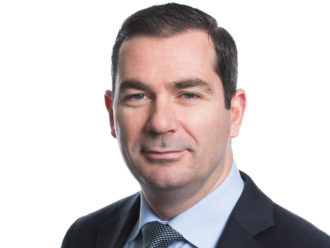Congratulations on your appointment as pensions minister. How have the first few months been?
It’s the best job in government. It offers an opportunity to touch everyone in this country and to make a difference to their lives.
You took on the role at a challenging time, when liability-driven investment (LDI) was making global headlines for the wrong reasons. What lessons can be drawn from that crisis?
I’ve spoken in front of the Work and Pensions Select Committee for a couple of hours on this. Broadly, LDI has done its job over a number of years in improving scheme performance. Funding levels are now in excess of 130% for defined benefit schemes, so we are in a good position, which is great news for the savers in those schemes.
Of course, there were issues which have been identified and it’s right that The Pensions Regulator and the Financial Conduct Authority have taken action around collateral buffers.
Also, the regulation around pooled funds is something we need to look at. Most schemes met their margin calls really well but some pooled funds found it harder, so regulation in that area is important.
Related to this is the second round of the DB funding code consultation, which has just closed. There have been calls to push back its implementation until next year. What is happening with that?
We are looking at it. We will make sure we consider the findings of the Lords Select Committee, which we have had, as well as the Work and Pensions Select Committee findings when that comes through.
One criticism of the DB funding rules is that they are pushing schemes into LDI strategies. Is there now a greater level of consideration that open DB schemes need to pursue a different investment strategy than closed DB schemes?
Obviously, the exact investment decisions are a matter for trustees not for the government, but yes, open and closed DB schemes need to be treated differently.
So risk measures should be different?
Exactly.
Moving from DB to DC: in January, you presented the Value for Money proposals, and it sounds like something you are passionate about.
I am passionate about pension savings and see my job as being on the side of pension savers. It’s important that we boost fairness, adequacy and predictability. Fairness is at the heart of the Value for Money proposals because it is massively different how adequate your pension is going to be depending on investment returns. And there is so little understanding and focus on returns.
I want to switch the focus from costs to returns. That is what Value for Money is going to do.
Three pensions ministers have looked over these proposals, so how much of Laura Trott is in them?
Whenever you take over a new brief, there are things in the in-tray that you have to decide what to do with. Whether you want to continue with them, change them or stop them altogether.
I am excited by the Value for Money proposals because they have the potential to boost returns for savers and that is what I am about. I want people to have the retirement income they want and deserve and Value for Money offers a massive opportunity to do that.
This is part of an overall vision I have in terms of how we are going to boost returns for DC savers in particular.
When people talk about pensions, too often, they only talk about defined benefit pensions. But that is not the world that many people are going to be entering into, which will be a lot more focused on defined contribution schemes.
Most [defined benefit] schemes are now closed. For most people, the pension they are paying into will be a defined contribution pension. We have to get defined contribution right.
At the moment, pot sizes are quite small but they are going to be a lot bigger as the effects of automatic enrolment kick in. We have to get this right. I want to make sure these defined contribution schemes are doing everything they can to deliver a decent retirement for people.
Could we see a paradigm shift from a focus on cost, which dominated in the early stages of auto enrolment, to a focus on investment outcomes?
Absolutely, because that will make a massive difference in terms of income. The stats on this are completely extraordinary in terms of the difference it will make on eventual pension outcomes.
One of the complications you just hinted at is that even within individual schemes, outcomes for different members can be different. How can this information be presented in a way that is more member focused?
We tried to focus the initiative mainly at pensions professionals to ensure that the schemes members are enrolled in are delivering a high value for money. We will have to look at how it works and make sure it is being effective. Then we can look at how we can expand it.
There is also talk of including forward-looking data on investment returns. How can you make sure such data is reliable?
As you rightly point out, this is part of a wider set of data we will be collecting. It’s important to understand where you are going to get to and then you can always compare it afterwards.
We would say to DC providers: “You thought you were going to get these returns, but what actually happened? And how ambitious are you going to be in terms of returns for savers? We will then evaluate their answers going forward. But it’s not just one metric that we are looking at.
Why haven’t ESG metrics been included in the Value for Money proposals?
There is already a huge amount of regulation on ESG and environmental metrics more broadly within pensions. What this is looking at, with a laser-like focus, is boosting returns for pension savers. That is why we only include things that will impact people’s retirement when they withdraw their cash.
Could greater transparency on asset allocations push schemes into the same asset types, a bit like DB schemes where a lot of money has gone into gilts?
Transparency is important for scheme members to understand where their money is being put. Going back to investment decisions are a matter for trustees, we need to make sure at the aggregate level that they are delivering for pension savers.
If we look, for example, at illiquid investments. I hope to see more of them because they generally deliver higher returns for savers and we are underinvested in the UK compared to other areas. We invest around 7% versus up to 19% in other markets.
They also have higher fees and there is controversy around that, isn’t there?
Yes, but fees are only paid if they deliver. This comes back to the shift from cost to returns because that will make the difference.
As part of that push for more investment in illiquids, you have announced more exemptions to the charge cap. What do you hope to achieve with that?
This comes back to the central point that as a country, we are underinvested in illiquids compared to elsewhere and we know that illiquids tend to have higher returns.
This is about removing barriers to make sure we are allowing DC schemes to invest in higher returns for members.
The Lord Mayor of the City and people in the fund industry would like to see a mandatory DC contribution to infrastructure. Is that a good idea?
I understand why people would be calling for that and I am clear that I would like to see more investment in illiquids because it benefits pension savers and I see my job as being an advocate for pension savers.
There are wider economic considerations which are important, so those debates are interesting. If you could show that it would increase returns for pension savers I would be interested in it.
But it is critical that we at the Department for Work and Pensions do not allocate where the pension schemes place their money. It’s important that we do not do that.
What I want to do is make sure we judge schemes on how they are performing, that they are getting the returns savers need. If they are not, they need to either consolidate or exit the market.
We have to remove barriers to allow them to seek those higher returns. That is how we are trying to do it.
Sounds like you are favouring more of a market-based approach rather than a mandatory infrastructure contribution?
I am looking at trying to encourage people to do things which will benefit pension savers with clear regulation around it. We are prepared to be interventionist where those returns are not being delivered. People are not engaged with their pensions so they often don’t know that the provider they are with might be making poor returns.
That is not good enough, and I am comfortable in saying that. Where schemes are poorly performing, The Pensions Regulator will step in and say that they have to either improve or exit the market.
So yes, I am happy for trustees to be given freedom on investment decisions but we will hold them accountable.
How tight will those rules be?
Much tighter. These are new powers that would be linked to the Value for Money framework. Of course, the consultation has now closed and we are going to be responding to that consultation.
But the idea behind it is that we are not just collecting data for the sake of it. The information is going to be standardised and published.
What we are saying is that on the basis of this data, The Pensions Regulator is going to be empowered to tell schemes that they either need to improve, consolidate, fold in or exit the market.
So we could be seeing a smaller number of master trusts?
Yes.
We have been talking a lot about infrastructure but it’s not a risk-free asset class. If investing in infrastructure is being incentivised through policy, how are you planning to protect DC savers from the investment risks?
It is important to consider – and Andrew Griffith, the economic secretary to the Treasury, talked about this when we were at the Work and Pensions Select Committee – that nothing is risk free. But there are protections in place for savers and we know that in general, illiquids produce higher returns, so that is why this is important.
Ultimately, it will boost adequacy, which is what we want to see. But it is a well-regulated sector and the overall performance is being monitored. That is the whole point of the Value for Money framework. If you are not getting the returns you should be getting, we will take action.
So, nothing is risk-free, but I am comfortable that there is a framework around this that will protect savers and hopefully boost their retirement income.
That is why I am so passionate about returns. The compound effect of that is enormous. Every year makes a difference. I feel that there is a sense of urgency in making sure we are doing all that we can for DC savers.
The emphasis for adequacy has been on returns, but there has been talk that auto-enrolment contribution levels should be increased.
There was a recommendation in the auto-enrolment review around reducing the age, which is one of the first steps I have taken as a priority. We should get those in place and then look at what more we can do.
The regulator has authorised the first Collective Defined Contribution (CDC) scheme in the UK. Could such schemes play a greater role in future?
CDCs are interesting. They have the potential to become an interesting part of the pensions market because they take away some of the investment risks by sharing them. It also means that when it comes to retirement, you don’t have the same life-styling factors you would have otherwise.
It is interesting and something we are looking at. For multi-employer CDC, we are looking at how we can go further on those. That has the potential to be interesting.
Do you get the sense that there is an appetite for CDC in the DC industry?
Absolutely. We are talking to a lot of people about this at the moment.
On the DC side I take it?
Yes.
So CDC could potentially take a greater share of the UK pensions market?
That could be an interesting development in the UK pensions market and it is one I am keen to push forward.
We have consulted on the multi-employer consultation that has just closed and looking at what we can do.
So you can’t tell me more about that right now?
It’s work ongoing, so I can’t comment. But I am clear in terms of my enthusiasm for this and my desire to push it forward.
What are your ambitions for the medium term?
I want to increase fairness, predictability and adequacy. Fairness means talking about the fact that between schemes there is a huge disparity. I want to reduce that disparity between DC schemes but also between DC and DB schemes. There is a gulf, which I am keen to narrow.
On adequacy: everything we talked about here is about adequacy. I am passionate about adequacy and making sure that we have higher returns so that people can get the retirement they want.
Every day I feel the pressure of making sure we boost those returns because the compound effect is huge. And predictability is just about people knowing a bit more about what they have and what they should expect. Part of what we are doing around small pots is around that.
Everything we are doing around small pots and around dashboards is aimed at that, ensuring that people know what they are going to get and understand what they can do to boost that as well in terms of increased contributions and making sure they get higher returns from their pension provider. There are lots that people can do in making sure they have an adequate pension.
The changes we are making around automatic enrolment are huge. We have the private members bill going through at the moment. That is going to be massive. Shifting the auto-enrolment age to 18 and making sure that people pay from the first pound they receive is a big change. I’m passionate about doing this.
LAURA TROTT MBE CV
2022 – current
Parliamentary Under-Secretary of State Department for Work and Pensions
2019 – current
MP for Sevenoaks and Swanley
2015 – 2017
Partner
Portland (PR & communications)
2015 – 2016
Political adviser, director of strategic communications 10 Downing Street
2012 – 2015
Political adviser, head of education and family policy No.10 Policy Unit
2010 – 2012
Special adviser
Cabinet Office
2009 – 2010
Political adviser
Conservative Party





Comments